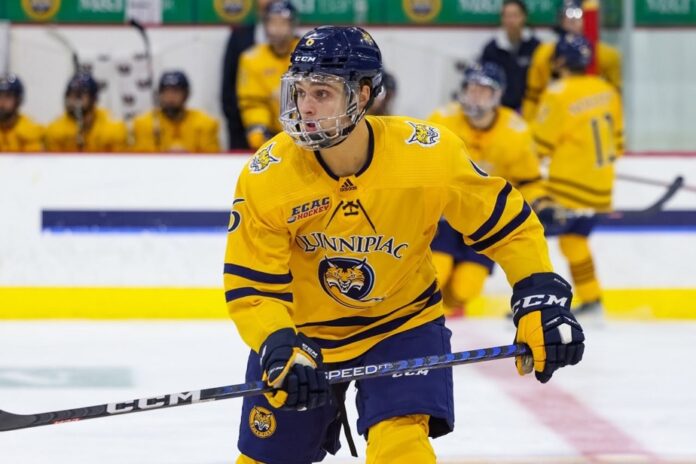We get a picture of the champion teams embarking on a trip worthy of The Hangover to celebrate their title. Thanks to the 2018 Capitals and others for continuing this pattern.
And then there’s Charles-Alexis Legault, defenseman for the Quinnipiac University Bobcats, crowned NCAA champions last Saturday. Legault misses the call from La Presse on Wednesday afternoon, but calls back a minute later.
“I’m sorry, I’m at the library, I wanted to find a quiet little corner,” he apologizes.
Such is life at the college level. After the euphoria of the championship, won in Tampa after a victory against Minnesota in the national final, you have to quickly dive back into the books. “We’re a month away from final exams. I got late in Tampa. I thought I was moving forward with my work, but I really focused 100% on hockey. »
Legault is one of those players who tries to excel in hockey as well as in school. He has also imposed a hellish work pace on himself, since he is enrolled in Quinnipiac’s “3 1” program: he does his bachelor’s degree in finance in three years and his MBA in the fourth year. A program that does not admit just anyone, let’s face it. “I studied at Sainte-Anne College in Lachine and I kept a good average,” he says.
This championship is a nice reward for Legault’s perseverance.
In 2018-19, at age 15, he was limited to two games with the Lac St-Louis Lions at the midget AAA level. The source of his problems: a double failure in the back, “and the head went from behind”, says his father, Alexandre Legault, himself a former 2nd round pick of the Oilers.
“He had recurring headaches. As soon as he had a shock, when he slept badly on the bus, he had headaches. The reflex of the doctors was to say: “You have a headache, you have a concussion”, recalls the father.
“It was daily, every time I exercised, for example, confirms the player. I slept on my stomach, I woke up and I had a headache because my neck was stuck. »
The family consulted many specialists, in search of answers. But over time, it became apparent that the young man’s symptoms were more related to a neck problem. A simple lack of strength.
“A lot of things can create concussion symptoms,” recalls the now 6’3″ and 214 lbs. I grew up quite quickly, I took a foothold between my secondary I and my secondary III. I was done for the long haul. Long neck, long arms, long legs. I didn’t have the muscle mass, so I often injured myself. »
Agent Philippe Lecavalier then intervened and put the family in contact with a doctor in Boston, “the one who had treated Patrice Bergeron when he had his problems”, explains the father.
The track was obviously the right one, since Bergeron now has 1293 games on the clock to prove it. And Legault has played in 40 of the Bobcats’ 41 games this season. The symptoms are a thing of the past.
“It was clearly a step backwards in my progress, but it was the best thing I could do,” Legault said, looking back. My career is a marathon, not a sprint. »
The other “detour” in his career came last year. Legault was to study and play at Boston University, like his father. But the Terriers recommended that he play another season in the BCHL, at the junior level.
“I said I understood their decision, but I was ready for college. So we separated. Quinnipiac got in touch with me right away, I toured the campus, loved it, and the night I visited, I called back to say I wanted to be a Bobcat. I signed up on May 10. And on July 25, I was in school! »
Boston University reached the semifinals of the NCAA Championship. Legault and the Bobcats won two more games when it mattered most.
“It’s extraordinary,” says Alexandre Legault. He is a little guy who is passionate, who understands the causal relationship between effort and result. It’s good that he understood that at such a young age and that he works so hard. »
It will now be necessary to see if the national title will attract the attention of recruiters. Last year, Charles-Alexis Legault was invited to the Senators development camp, and if he is still ignored at the next draft, it should not be surprising to see him resound at another summer camp. He has an enviable build and even without playing on the power play, he has amassed 9 points in 40 games as the club’s youngest skater.
In the NHL Central Scouting mid-season rankings, he ranked 123rd among North American skaters. At 19 — turning 20 in September — he’s in his final year of draft eligibility, but could still earn a free agent contract in future years if the teams pass.
If he sees his career as a marathon, it is not one more detour that will bring him down.















